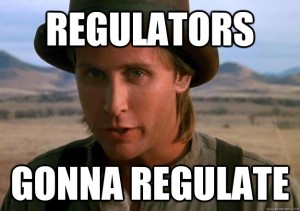If there’s one issue that I keep returning to again and again on Tattoo Blog, it’s the issue of regulation. It’s a bit of a thorny issue for many and opinions tend to run deep on both sides of the coin. I’ve spoken to tattooists who feel that to regulate tattoo is to introduce a bunch of overly bureaucratic red tape that will be consistently reinforced by government employees who have zero understanding or familiarity with what tattooists actually do. The fear here is that a level playing field will not necessarily aid tattoo, but debilitate more established artists, forcing them to abandon techniques that while not necessarily unsanitary, won’t pass the outdated and narrow frames of reference that government intervention will bring. What this will then ostensibly do is force individual time honoured and tested techniques to be abandoned in favour of an across the board standard, effectively killing years of trial and error technical efforts on the part of tattooists. In essence, the skills and methods that made a tattooist who he or she currently is could be summarily wiped out, placing them under the jurisdiction of the same methods used by one and all.
Not having worked in the tattoo industry myself, I can still relate somewhat to this situation due to my time spent working in various kitchens. Health inspectors offer a valuable service, but their methods and demands are all too often ridiculously removed from the realities of everyday life in a professional kitchen. They tend to be more of a burden than an aid in the long run. That’s not to say that I wish to see health and safety standards ignored in either the tattoo studio or the kitchen, but some standards are capable of doing more harm than good.
On the other hand, the ease with which tattoo equipment can purchased online has had a profound impact on the rise of scratchers. Whatever negative elements that regulation might bring, I firmly believe that no at all regulation is worse for the simple fact that without regulation, scratchers have an advantage. That advantage damages the reputability of tattooists who have worked very hard to get to where they are today. For this reason, I’m glad to see that Pennsylvania is now making concrete steps toward regulation of their tattoo industry. Yes, the government has no real clue what tattooists do, but if this is truly a concern amongst tattooists, then they should be actively working to lobby for realistic statutes which deal with health concerns in a knowledgeable way. If for some reason this is not possible, then tattooists will simply need to find new ways under regulation to forge ahead and differentiate their process from others.
